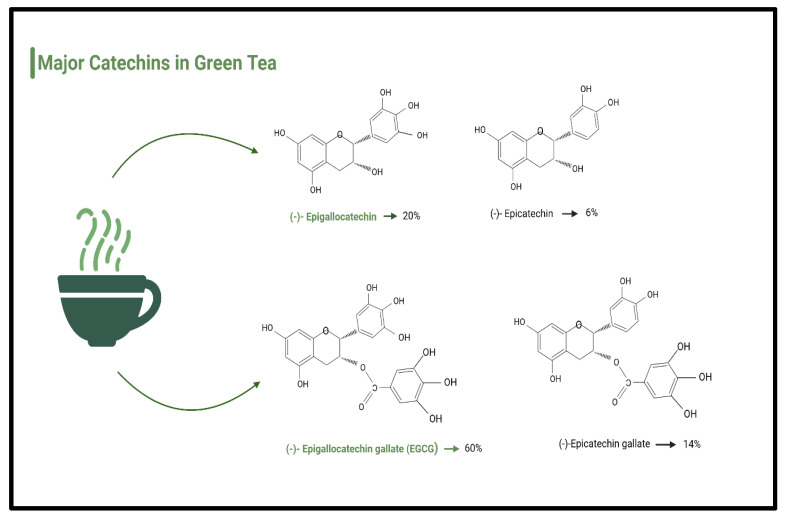兒茶素,是一種主要存在於綠茶中的天然抗氧化物質,它屬於多酚化合物,飲用抹茶時能夠攝取的含量尤其豐富,這是因為抹茶將整片茶葉研磨成細粉,因此飲用抹茶時,實際上是攝取了整片茶葉的營養。
要特別注意的是,兒茶素這個名詞和另外兩個名詞常常混用,一個是茶多酚,另一個是 EGCG。
其中,茶多酚包含了兒茶素,兒茶素又包含了 EGCG。茶葉中的茶多酚中大約有 70% 是兒茶素,兒茶素中又大約有 70% 是 EGCG。因為這樣大比例的包含關係,所以這幾個名詞的混用雖然不大精確,但通常來說,其產生的論述仍大致正確。
兒茶素是科學界研究最多的茶成分,因為已經驗證過的健康益處眾多,包括:
抗氧化作用
兒茶素是強大的抗氧化劑 [1, 2],能夠抵抗自由基的損害,自由基是導致細胞老化和多種疾病的原因之一。兒茶素能夠有效清除自由基,保護細胞免受氧化壓力的傷害,從而延緩衰老過程。
預防多種慢性疾病
研究表明,攝取足夠的兒茶素可以降低罹患心血管疾病、糖尿病、癌症等慢性病的風險 [3, 4]。這與兒茶素的抗炎和調節血糖、血脂的作用密切相關。
增強免疫力
兒茶素有益於免疫調節 [5, 6],它能夠刺激免疫細胞的活性,提高機體抵抗病毒和細菌入侵的能力。同時,兒茶素也有助於緩解過敏反應,對於改善過敏性鼻炎等疾病有一定的療效。
有助於減肥
兒茶素在減肥應用的研究很多,這些研究發現包括:
- 可以增加人體24小時的能量消耗和促進脂肪氧化,而且比單獨攝取咖啡因更好 [7]
- 有助於降低男性體重、BMI、腰圍和體脂肪 [8]
- 除降低體重外,在體重維持方面也有很正面的效果 [9]
- 具有抗氧化和影響能量代謝的作用,能降低體重、緩解代謝綜合症 [10]
- 除能提高能量消耗和促進脂肪氧化,對 BMI、腰圍和總體脂肪重量也有幫助 [11]
- 兒茶素還能透過抑制肥胖誘導的炎症反應,降低氧化壓力等機制,避免肥胖症 [12]
特別是,抹茶中高濃度的兒茶素可以增加身體的熱量產生,從而促進脂肪的燃燒。
儘管如此,考慮肥胖症是一種複雜的多因素疾病,改善的方式也需要多面兼顧。
抗癌特性
抹茶中豐富的兒茶素具有潛在的抗癌特性。
在早期的研究就已經顯示,兒茶素能夠抑制癌細胞的生長和擴散,尤其是在乳腺癌和前列腺癌的預防和治療方面展現出希望 [13]。
後來的研究仍持續不斷,許多研究都顯示茶兒茶素對致癌作用及癌細胞生長的有抑制活性,包括大腸癌、前列腺癌等 [14]。
EGCG 可增強抗腫瘤免疫反應,減少肺腫瘤數量 [15]。
很多研究都顯示,兒茶素可能有預防和治療癌症的作用,其中又以 EGCG 的效果最好。總體來說,兒茶素可以影響多個癌症相關的細胞途徑,包括生存、增殖、侵襲、血管新生和轉移 [16]。
近期的研究文獻匯總顯示,茶中的兒茶素對多種癌症有拮抗作用,如婦科腫瘤、消化道腫瘤、膠質瘤、肝癌、膽囊癌、肺癌等 [17]。
最近研究指出,除了兒茶素,結合其它的天然抗氧化物來達成協同抗癌作用應該是一個值得研究的方向 [18]。
其實抹茶本身就具有多樣且豐富的天然抗氧化物,所以雖然還需更多研究證實,但已能推估它是一個特別好的抗癌食品,比一般的綠茶或綠茶萃取物都好。
改善腦功能
雖然一般認為抹茶對腦功能或認知機能的好處主要來自於L-茶胺酸,但最近證實,兒茶素也很有貢獻。
研究顯示,EGCG的代謝物可能與EGCG的有益活性一起,在減少神經退行性疾病方面發揮重要作用 [19]。
另一項研究顯示,單次攝入兒茶素後,反應時間縮短;而每日攝入兒茶素 12週後,工作記憶有所改善 [20]。
抹茶因為兼具豐富的 L-茶胺酸和兒茶素,不意外地對腦功能的幫助非常出色。
總結來說,兒茶素作為一種強大的抗氧化劑和多酚化合物,在抹茶中的高含量使得抹茶成為一種具有多方面健康益處的飲品。從促進心血管健康到抗癌、控制體重,再到改善腦功能,兒茶素的效益是多面的,讓我們一起享受抹茶帶來的健康益處吧!(免責聲明)
參考資料
[1] Forester, S. C., & Lambert, J. D. (2011). The role of antioxidant versus pro-oxidant effects of green tea polyphenols in cancer prevention. Molecular Nutrition & Food Research, 55(6), 844–854. https://doi.org/10.1002/mnfr.201000641.
[2] Sheng, Y., Sun, Y., Tang, Y., Yu, Y., Wang, J., Zheng, F., Li, Y., & Sun, Y. (2023). Catechins: Protective mechanism of antioxidant stress in atherosclerosis. Frontiers in Pharmacology, 14, 1144878. https://doi.org/10.3389/fphar.2023.1144878.
[3] Eng, Q. Y., Thanikachalam, P. V., & Ramamurthy, S. (2018). Molecular understanding of Epigallocatechin gallate (EGCG) in cardiovascular and metabolic diseases. Journal of Ethnopharmacology, 210, 296–310. https://doi.org/10.1016/j.jep.2017.08.035.
[4] Shirakami, Y., Sakai, H., Kochi, T., Seishima, M., & Shimizu, M. (2016). Catechins and its role in chronic diseases. In Advances in Experimental Medicine and Biology, 929, 67–90. https://doi.org/10.1007/978-3-319-41342-6_4.
[5] Pae, M., & Wu, D. (2013). Immunomodulating effects of epigallocatechin-3-gallate from green tea: Mechanisms and applications. Food & Function, 4(9), 1287–1303. https://doi.org/10.1039/c3fo60076a.
[6] Wang, S., Li, Z., Ma, Y., Liu, Y., Lin, C. C., Li, S., Zhan, J., & Ho, C. T. (2021). Immunomodulatory effects of green tea polyphenols. Molecules, 26(12), 3755. https://doi.org/10.3390/molecules26123755.
[7] Dulloo, A. G., Duret, C., Rohrer, D., Girardier, L., Mensi, N., Fathi, M., Chantre, P., & Vandermander, J. (1999). Efficacy of a green tea extract rich in catechin polyphenols and caffeine in increasing 24-h energy expenditure and fat oxidation in humans. The American Journal of Clinical Nutrition, 70(6), 1040-1045. https://doi.org/10.1093/ajcn/70.6.1040.
[8] Nagao, T., Komine, Y., Soga, S., Meguro, S., Hase, T., Tanaka, Y., & Tokimitsu, I. (2005). Ingestion of a tea rich in catechins leads to a reduction in body fat and malondialdehyde-modified LDL in men. The American Journal of Clinical Nutrition, 81(1), 122–129. https://doi.org/10.1093/ajcn/81.1.122.
[9] Hursel, R., Viechtbauer, W., & Westerterp-Plantenga, M. S. (2009). The effects of green tea on weight loss and weight maintenance: A meta-analysis. International Journal of Obesity, 33(9), 956–961. https://doi.org/10.1038/ijo.2009.135.
[10] Yang, C. S., Zhang, J., Zhang, L., Huang, J., & Wang, Y. (2016). Mechanisms of body weight reduction and metabolic syndrome alleviation by tea. Molecular Nutrition & Food Research, 60(1), 160–174. https://doi.org/10.1002/mnfr.201500428.
[11] Kapoor, M. P., Sugita, M., Fukuzawa, Y., & Okubo, T. (2017). Physiological effects of epigallocatechin-3-gallate (EGCG) on energy expenditure for prospective fat oxidation in humans: A systematic review and meta-analysis. The Journal of Nutritional Biochemistry, 43, 1–10. https://doi.org/10.1016/j.jnutbio.2016.10.013.
[12] Basu, T., Selman, A., Reddy, A. P., & Reddy, P. H. (2023). Current status of obesity: Protective role of catechins. Antioxidants, 12(2), 474. https://doi.org/10.3390/antiox12020474.
[13] Fujiki, H., Suganuma, M., Okabe, S., Sueoka, E., Suga, K., Imai, K., Nakachi, K., & Kimura, S. (1999). Mechanistic findings of green tea as cancer preventive for humans. Proceedings of the Society for Experimental Biology and Medicine, 220(4), 225–228. https://doi.org/10.1046/j.1525-1373.1999.d01-38.x.
[14] Yang, C. S., & Wang, H. (2016). Cancer preventive activities of tea catechins. Molecules, 21(12), 1679. https://doi.org/10.3390/molecules21121679.
[15] Rawangkan, A., Wongsirisin, P., Namiki, K., Iida, K., Kobayashi, Y., Shimizu, Y., Fujiki, H., & Suganuma, M. (2018). Green tea catechin is an alternative immune checkpoint inhibitor that inhibits PD-L1 expression and lung tumor growth. Molecules, 23(8), 2071. https://doi.org/10.3390/molecules23082071.
[16] Farhan, M. (2022). Green tea catechins: Nature’s way of preventing and treating cancer. International Journal of Molecular Sciences, 23(18), 10713. https://doi.org/10.3390/ijms231810713.
[17] Li, X. X., Liu, C., Dong, S. L., Ou, C. S., Lu, J. L., Ye, J. H., Liang, Y. R., & Zheng, X. Q. (2022). Anticarcinogenic potentials of tea catechins. Frontiers in Nutrition, 9, 1060783. https://doi.org/10.3389/fnut.2022.1060783.
[18] Oh, J. W., Muthu, M., Pushparaj, S. S. C., & Gopal, J. (2023). Anticancer therapeutic effects of green tea catechins (GTCs) when integrated with antioxidant natural components. Molecules, 28(5), 2151. https://doi.org/10.3390/molecules28052151.
[19] Pervin, M., Unno, K., Takagaki, A., Isemura, M., & Nakamura, Y. (2019). Function of green tea catechins in the brain: Epigallocatechin gallate and its metabolites. International Journal of Molecular Sciences, 20(15), 3630. https://doi.org/10.3390/ijms20153630.
[20] Baba, Y., Inagaki, S., Nakagawa, S., Kaneko, T., Kobayashi, M., & Takihara, T. (2020). Effect of daily intake of green tea catechins on cognitive function in middle-aged and older subjects: A randomized, placebo-controlled study. Molecules, 25(18), 4265. https://doi.org/10.3390/molecules25184265.

留言